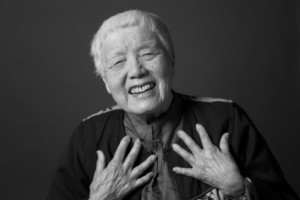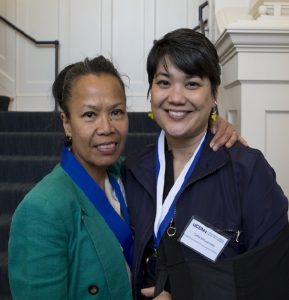
Grass-roots organizer, philosopher, teacher and revolutionary – Grace Lee Boggs leaves the Asian American community to mourn her passing on October 5, 2015 in her beloved Detroit. She also leaves an enduring legacy of empowering the poor, the working class and communities of color, as well as the wealth of ideas and activism that ranged from civil rights, black power, environmental justice, human rights, and radical feminism.
Born to Chinese immigrants in Providence, Rhode Island she earned her Ph.D. in philosophy from Bryn Mawr College (PA) in 1940. Grace moved to Detroit in 1953 and married autoworker Jimmy Boggs, an African American who was part of the great migration to the industrial cities of the North from the Jim Crow South of the time. And together, they made a formidable couple who committed their life work to the struggle for black freedom. In Thomas Sugrue’s “Postscript: Grace Lee Boggs” for The New Yorker, he writes,
“Grace was passionate but seldom dogmatic, and unlike many of her comrades she was perfectly willing to reconsider her political positions. In her view, revolution was a process, and it required improvisation and a long-term view.”
In November of 2001, the Institute and the Asian American Cultural Center scheduled to host Grace Lee Boggs at UConn to introduce her to students and her 1998 memoir Living for Change (Univ. of Minnesota Press) via the slAAm! Book Club. Unable to attend, she sent UMass-Boston’s Michael Liu in her place and he read a letter from Grace whose text is reprinted and excerpted below. Fourteen years on and her words ring true and urgent as ever. LONG LIVE GRACE!
Dear Friends,
How do those of us whose humanity has been enriched by our struggles to define our ethnic identity draw upon this enriched humanity to create a new kind of citizenship and leadership in this period of vulnerability, turbulence and transition …?
As I have grappled with this question, I often refer back to the passage in the 1976 pamphlet “Towards a New Concept of Citizenship” [written by Jimmy Boggs].
This nation was founded by a great revolution which inaugurated an age of revolutions all over the world because it gave men and women a new concept of themselves as self-governing human beings, i.e. as citizens rather than subjects. In other words, instead of being masses, who think of themselves as victims and only make demands on others, they were ready to make demands on themselves.
This country is still in its infancy. The ancestors of the overwhelming majority of today’s Americans were not among the few who founded this nation … and established the political and social patterns which have brought us to the present crisis. The ancestors of today’s blacks were here – but they were excluded from participation … even though their labor was building the infrastructure which made possible this country’s rapid development. Thus, the people now living in the United States have had no real experience of the great revolutionary struggles by which any great nation is created. That political and humanizing experience still lies before us all.
Grace Lee Boggs
Detroit, Michigan 11/27/01
PHOTO CREDIT: Robin Holland

